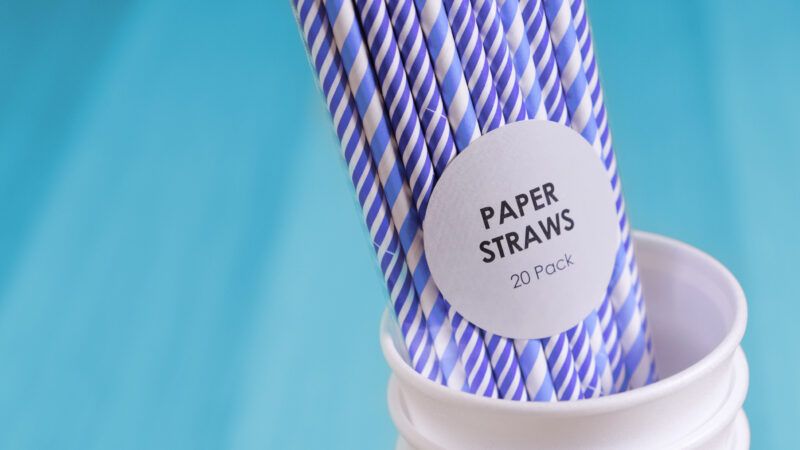Presence of 'Forever Chemicals' in Paper Straws Highlights the Inanity of Plastic Straw Bans
A new study from Belgian researchers found that paper straws had higher concentrations of long-lasting, water resistant "forever chemicals" than plastic or steel straws.

When Kamala Harris was asked about whether she'd support a ban on plastic straws during a 2019 CNN town hall event, the then-senator and presidential candidate briefly made a stab at appearing human and folksy by talking about how much she hated widely loathed paper straws.
"It's really difficult to drink out of a paper straw. If you don't gulp it down immediately, it starts to bend, and then, you know, the little thing catches it. We have to kind of perfect that one a little bit more," she said, chuckling awkwardly.
The deficiencies of paper straws notwithstanding, Harris nevertheless endorsed a ban on plastic straws as a necessary measure to protect the environment.
But as it turns out, even a perfected paper straw might not be a win for the planet.
A new study published yesterday by Belgian researchers in the journal Food Additives & Contaminants found that paper straws contained higher concentrations of poly- and perfluoroalkyl substances (PFAS)—more commonly known as "forever chemicals" because of how long they take to break down in nature—than plastic and steel straws.
PFAS are frequently used in consumer products and industrial processes, given their water- and fire-resistant properties. Their use is also controversial given that they can be toxic at high concentrations, and even small concentrations can accumulate in bodies and natural environments over time.
Dozens of states have already passed laws to restrict some PFAS. Similar, unsuccessful efforts have been introduced in Congress. The European Union has also considered banning them.
These efforts have done little to keep forever chemicals out of paper straws, however.
The Belgian study found that, of the 39 brands of straws tested, those made of paper and bamboo were more likely to have PFAS present. Paper straws also had higher concentrations of PFAS than plastic straws.
The study's authors said the inclusion of PFAS could be intentional, as the chemicals' water-repellency would be useful in preventing straws from turning into a pulpy mess when stuck in a drink. They also say that these chemicals could unintentionally wind up in paper straws as a result of PFAS use in recycling processes.
Whatever the case, the Belgian researchers argue that the greater presence of PFAS in paper straws could actually make them less environmentally friendly than the plastic straws they're meant to replace.
"These 'eco-friendly' plant-based straws are not necessarily a more sustainable alternative to plastic straws, because they can be considered as an additional source of PFAS exposure in humans and the environment (e.g. after degradation in landfills or through incomplete incineration)," write researchers.
They suggest stainless steel straws—which were found to have no PFAS—as the truly sustainable alternative.
To be sure, the harms PFAS pose to human and environmental health are the subject of ongoing research and scientific controversy. Their presence in paper straws is nevertheless a useful illustration that there are always tradeoffs and costs to environmental policies, even when one only cares about the goal of "sustainability."
Beginning in the late 2010s, plastic straws became a target of bans, boycotts, and consumer awareness campaigns because of their (incredibly minimal) contribution to the admittedly serious problem of plastic pollution.
Their prohibition would, it was thought, reduce plastic waste getting into the environment. But to the degree that these bans led people to substitute paper for plastic, all they've done is swap out some minimal amount of plastic consumption for increased PFAS pollution.
Is that a worthwhile environmental tradeoff? I'm not sure. I don't think that's a question something the people over at Straw Wars or the Seattle City Council (which passed the first straw ban in a major city) ever asked themselves.
Should we perhaps replace paper and plastic straws with steel ones, as the authors of the Belgian study suggest?
That would cut down on both PFAS and plastic pollution. On the other hand, the manufacture and transportation of heavier steel straws would surely increase greenhouse gas emissions. Are less plastic and fewer forever chemicals worth more carbon in the atmosphere?
These environmental tradeoffs don't even touch the other costs of plastic straw and bag bans, in terms of higher costs for businesses, less convenience for consumers, and less choice for everyone. Once you start roping those factors in, the scales start to lean pretty heavily indeed against plastic straw bans.
The straw-banning fervor of the 2010s seems a little silly in retrospect. (Perhaps that's why Kamala Harris was awkwardly laughing through her answer in that CNN town hall?)
Nevertheless, there have been some revisionist defenses of these bans as of late.
Environmentalist magazine Grist argued these bans succeeded as a "gateway" ban. The loss of ubiquitous plastic straws got people to wake up to all the expendable plastic items that governments could easily ban. Seemingly performative straw bans beget bans and restrictions on plastic forks, plates, and ketchup packets.
As it turns out, expanding straw bans to other peripheral plastic items hasn't, in fact, arrested global plastic production.
If anything, these bans just spread the very unproductive idea that governments can address large environmental problems by banning straws, forks, or whatever else. Focusing on individual items is failing on its own terms. It's also blinding people to potentially serious tradeoffs as well.
Rent Free is a weekly newsletter from Christian Britschgi on urbanism and the fight for less regulation, more housing, more property rights, and more freedom in America's cities.


Show Comments (32)